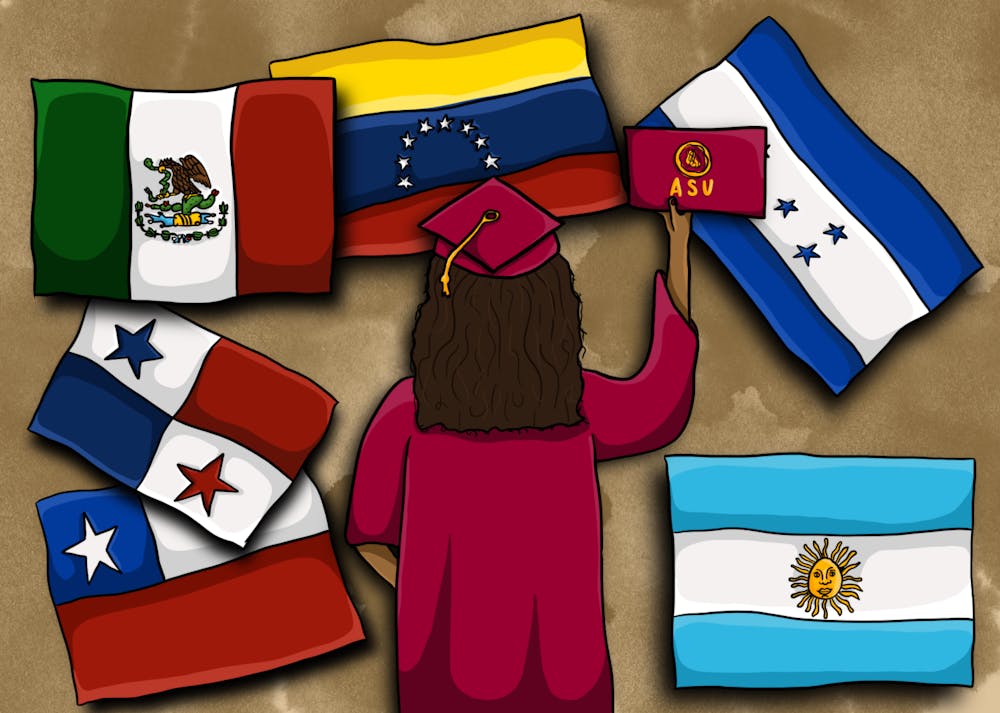Young Latino voters have the strongest voting bloc ever in the upcoming 2024 election, yet activating this population is the biggest challenge.
In Arizona, 25% of the over 4 million eligible voters are Hispanic, according to the PEW Research Center. Overall, eligible Hispanic voters tend to be younger, with 67% of them in the U.S. under the age of 50. In battleground states like Arizona, the number of young Hispanic voters now exceeds the margin by which the 2020 election was won.
Within presidential elections, the turnout rates among these voters typically tend to be some of the lowest. Stella Rouse, director of the Hispanic Research Center, said that young Latinos might change this trend.
Rouse said that the recent shift from President Joe Biden to Vice President Kamala Harris as the Democratic candidate has reinvigorated voters who might have otherwise opted out of voting.
"Young Latinos are much more mobilized to vote in this election than they were three months ago," Rouse said.
In general, voting can be a challenge for the Hispanic community. Rouse said the structural barriers and inequalities prevent many Latinos from civic engagement. In 2020, 21% of eligible voters did not vote because they faced barriers like long voting lines, voting requirements and polling locations that disproportionately affect Black and Brown communities, according to Public Wise.
"There’s a huge psychological barrier to trying to get young people and young Latinos to come out and make the effort to vote, and say that their vote does matter because everything that they've grown up with signifies that perhaps it really doesn't," Rouse said.
Rouse said the best way to overcome these barriers is to reach out directly to young Latinos and earn their vote.
"Outreach by either nonprofits, candidates, or parties themselves tends to make a difference in actually getting young Latinos, young people and Latinos, in particular, to come out and vote," Rouse said.
Nonprofits like Voto Latino, an organization aimed at increasing the civic engagement of young Latino and Hispanic voters, do exactly that.
"The Latino electorate is young, and that's why we're trying to ... meet them where they are and to reach out to them and motivate them to get out and vote," said Diana Castañeda, vice president of communications for Voto Latino.
Castañeda said Voto Latino targets their voting encouragement to where the majority of their young audience is: social media. Celebrity partnerships with Rosario Dawson and Jessica Alba can help stress the importance of voting to the Voto Latino audience.
Another obstacle for young Latinos is representation in policy and candidates. Castañeda specifically cited in the last election that only nine Latinos were elected to Congress, making up 11.28% of the House in comparison to the 19.1% Hispanic population of the U.S.
"We need to get more people that actually look like us and represent us because we are the biggest minority in the U.S.," Castañeda said.
READ MORE: State Press 2024 Election Coverage
Alberto Plantillas, a graduate student studying public policy, agreed that the lack of representation in Congress is a significant issue. He said that voting is important for him and other young Latinos because, without their participation, policies are created without considering their interests.
"So if you want to be involved in the process, you should vote because it's not just about people, it's also about policies," Plantillas said.
According to the UCLA Latino Policy & Politics Institute, once Latino voters are registered, 88% of them cast a ballot, demonstrating that the largest obstacles in the voting process — the barriers related to registration. These barriers include voter ID requirements, employment obligations lowering political participation and mistrust of the government, according to NPR.
"Young Latinos care about climate change; they care about student loans and education; they care about jobs and the economy," Rouse said. "And so speaking to them directly about what candidates are going to do for them in particular is really important to get them motivated."
This content was contributed by an author who does not work at The State Press. If you are a community member who would also like to contribute, please email execed.statepress@gmail.com.
Edited by George Headley, Sophia Braccio, Tiya Talwar and Natalia Jarrett.
Reach the reporter at nmarrin@asu.edu and follow @nataliamarrin on X.
Like The State Press on Facebook and follow @statepress on X.




